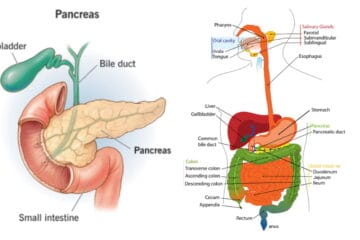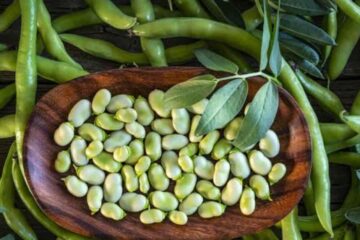Table of Contents
Introduction
There are many different alternative milks to choose from nowadays. But some, like coconut milk, are staples that have been around much longer than the trend. Its milk is build from the flesh of mature or adult coconuts and mixed with water to thin it.
Coconut milk may provide essential vitamins & nutrients, including vitamin C and iron. However, it may also contain many calories and saturated fats. It has newly become very popular.
It’s a tasty substitute for cow’s milk that provides many health benefits.
This article takes a brief look at coconut milk.
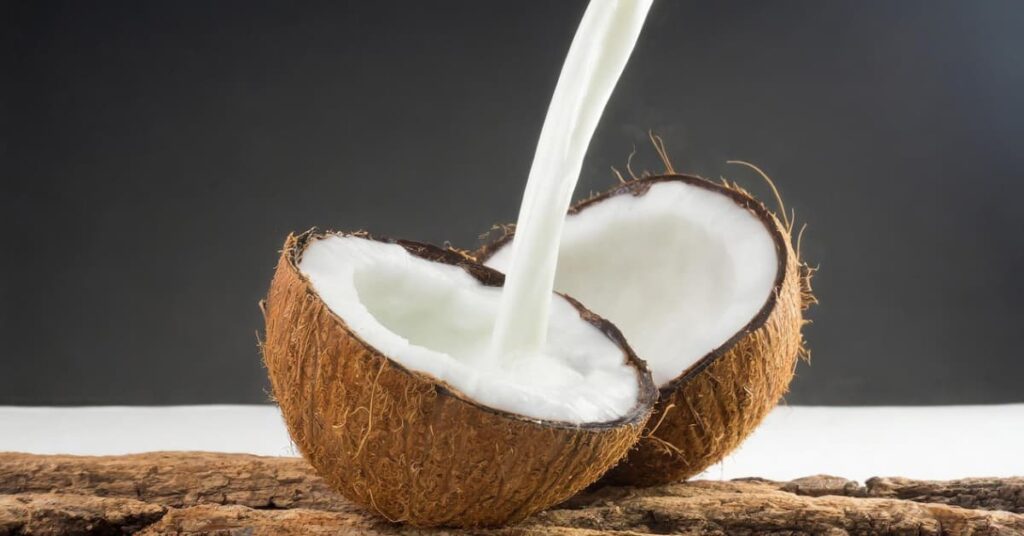
Coconut milk
It arrives from the white flesh of mature brown coconuts, the fruit or crop of the coconut tree.
The milk has a thickset consistency and a rich, creamy texture.
Other Southeast Asian and Thai cuisines usually include this milk. It’s also popular in India, Hawaii, and certain South American & Caribbean countries.
It should not be confused with coconut water, which is naturally found in immature green coconuts.
Unlike coconut water, milk does not happen naturally. Alternatively, solid coconut flesh is mixed with water to make its milk, that is about 50% water.
On the other hand, coconut water is about 94 percent water. It contains much less fat & far fewer nutrients than its milk.
It is arranged as thick or thin based on uniformity and how much it’s processed.
- Thick: Solid coconut flesh is finely ground, cooked, or simmered in water. The mix is then strained through cheesecloth to make thick milk.
- Thin: After producing thick milk, the grated coconut remaining in the cheesecloth is poached in water. The straining process is then replicated to create thin milk.
In traditional cuisines, thick milk is utilized in desserts and thick gravies. Thin milk is used in soups & thin sauces.
Most canned milk has a combination of thin and thick milk. It’s also very easy to manufacture milk at home, adjusting the thickness to the liking.
Coconut milk nutrition
Its milk is a high-calorie food.
About 93% of its calories come from saturated fats known as medium-chain triglycerides (MCTs).
Milk is also a good source of vitamins & minerals. One cup (240 grams) contains:
- Calories: 552
- Fat: 57 grams
- Protein: 5 grams
- Carbs: 13 grams
- Fiber: 5 grams
- Vitamin C: 11% of the RDI
- Folate: 10% of the RDI
- Iron: 22% of the RDI
- Magnesium: 22% of the RDI
- Potassium: 18% of the RDI
- Copper: 32% of the RDI
- Manganese: 110% of the RDI
- Selenium: 21% of the RDI
In addition, some experts believe its milk contains unique proteins that may provide health benefits. However, more research is needed.
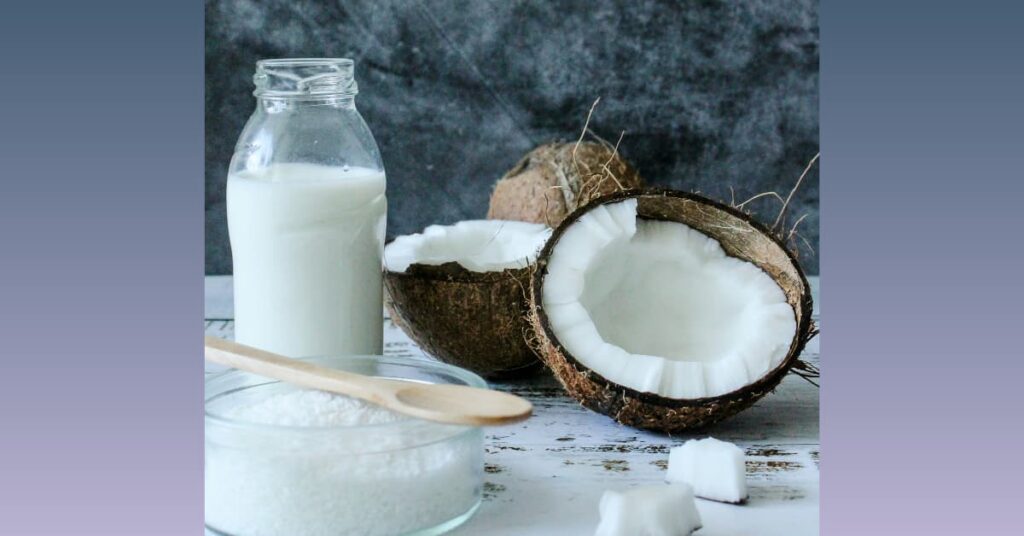
Coconut Milk Benefits
The benefits of drinking this milk are as follows:
1. As a Source of Energy
It has medium-chain fatty acids that are metabolised differently from long-chain fats. These fatty acids are typically transported directly to the liver, where they may be rapidly converted into energy rather than stored as fat. Moreover, further research is needed to confirm its usefulness as a consistent energy source. Always take in moderation and seek medical advice if unsure.
2. To Improve Digestion
The medium-chain (MCT) fatty acids in coconut milk are generally easier to digest and absorb. These fats may be broken down quickly without requiring pancreatic enzymes, potentially supporting those with digestive difficulties. However, more studies are needed, and people should consult a healthcare professional before using this milk. Further research on the effect of this milk on digestion is required.
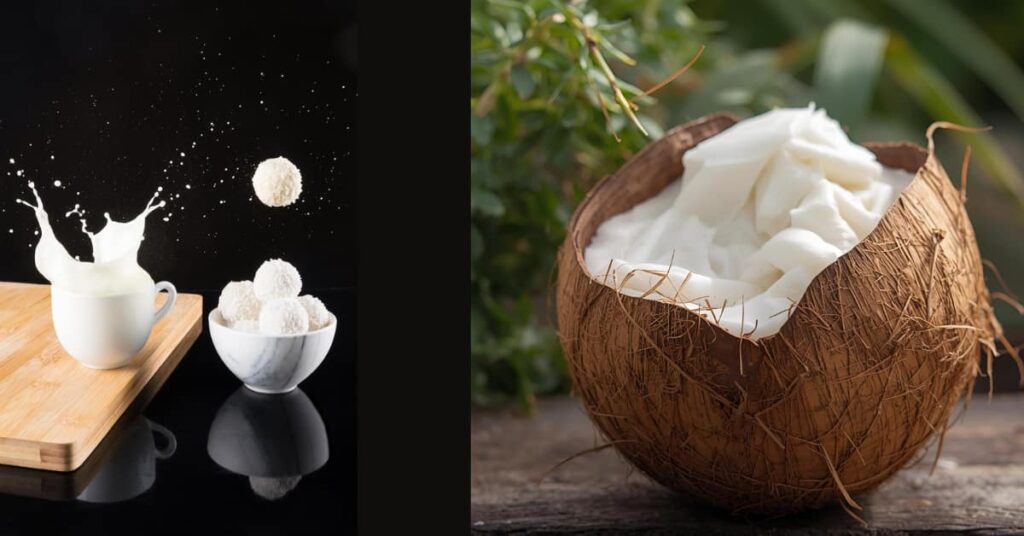
3. For Viral Infections
Coconut milk may help fight against viruses like herpes and HIV. Monolaurin in it may disrupt the lipid membranes of the virus, causing disintegration of the viral envelope and restricting its activity. However, further studies are required to assess the effect of milk on viral infections. Some viral infections are dangerous. In such cases, you must consult your doctor instead of self-medicating.
4. For Fungal Infections
Some studies suggest that milk may exhibit antifungal properties, particularly against Candida albicans. A compound found in this milk, monolaurin, is believed to disrupt fungal cell membranes. However, further research is needed, and this milk should not be used as a substitute for medically approved antifungal treatments. More research is required to confirm the antifungal activity of this milk, and if you suspect a fungal infection, you must immediately consult your doctor and seek proper treatment.
5. For Bacterial Infections
It is thought to possess mild antimicrobial properties. Some studies indicate it may act against certain bacterial strains, including Staphylococcus, Streptococcus, and E. coli. Monolaurin, a compound in this milk, is believed to disrupt bacterial cell membranes. However, this milk should not be considered a replacement for medically prescribed antibacterial treatments. Further studies are required to confirm the antibacterial properties of this milk. You must consult your doctor if you suspect a bacterial infection and get treated instead of self-medicating.
6. For Cancer
It can be beneficial for cancer. Various researches on cell lines have shown that it may help with cancer. It may kill the cancer cells & suppress the growth of cancer-causing cells. This milk may fight against cancer cells due to its antioxidant properties. Further clinical studies are required to determine the effect of this milk on cancer. However, cancer is a severe disease, and you should get proper medical checkups sooner than self-medicating.
7. For Reducing Cholesterol Levels
Some investigations recommend that the fatty acids in this milk can influence cholesterol levels. An investigation involving healthy adults aged 25–60 showed a possible decrease in LDL (bad) cholesterol and an expansion in HDL (good) cholesterol. Nevertheless, more evidence is needed, and this milk should be taken in moderation as part of a balanced diet. It is vital to check cholesterol levels regularly and consult a doctor in case of abnormal cholesterol levels.
8. For Managing Anxiety
Animal studies suggest that coconut milk may have antioxidant properties that could help manage anxiety, possibly due to nutrients like vitamin C, vitamin E, selenium, and zinc. However, human studies are needed to confirm these effects. Anyone experiencing anxiety or panic attacks should seek professional help from a psychiatrist or therapist.

Usages
There are some opportunities to add this milk to meals & drinks. It is a primary or principal ingredient in many Indian & Malaysian dishes, for example.
Here are some examples:
- Smoothies: Use coconut milk or try this healthy milk smoothie recipe.
- Cereal: Try replacing or changing dairy milk with coconut milk.
- Soups: This milk can be used as a base for any creamy soup, for example, Tom Kha, a Thai coconut soup.
- Oatmeal: Use milk as the liquid in oatmeal. Take a can of milk to a boil. Stir in one cup of oats. Cook it for 15 minutes or until the milk is absorbed. Top with fruit and cinnamon. See the full recipe here.
- Sauces: Add coconut milk to the gravy, as in this cashew nut curry.
People can use coconut milk products as a plant-based diet instead of dairy milk products.
Coconut milk Side effects
1. Higher in Saturated Fat
Saturated fat consumption should be 10 percent or less of your daily calories. If you’re eating a 2,000-calorie diet, this correlates to about 22 grams of saturated fat in per day. Therefore, a 1-cup serving of coconut milk, containing 5 grams of saturated fat, already contributes over 20% of your daily intake. Excess saturated fat consumption may concern heart health over time, so consider how coconut milk fits into the rest of your day. Also, balance your saturated fat intake (from coconut milk or otherwise) with sources of unsaturated fats like olive oil, nuts, seeds, avocados, and fish.
2. Lower in Protein
Coconut milk has a significantly lower protein content than cow’s milk or soy milk, so don’t rely on it to help meet your protein needs. Try to set it with a source of protein to help slow down how quickly it gets digested—doing so will help support healthy blood sugar levels.
3. May Contain Added Sugar
Nilforoush also recommends being mindful that sweetened or flavored coconut milk products often contain added sugars. Most Americans overeat this nutrient, which can lead to dental decay, insulin resistance, and a higher risk of chronic disease. Instead, reach for unsweetened coconut milk. If you prefer some sweetness, try flavoring it at home with a small splash of vanilla extract or a slight drizzle of honey or maple syrup to taste.
Coconut milk powder
Coconut milk powder is a good, white powder used in Southeast Asian & other cuisines. Coconut milk powder is built through the spray drying process of raw unsweetened coconut cream & is reconstituted with water to utilize in recipes that call for coconut milk. Many commercially available coconut milk powders list milk or casein among their ingredients. Some coconut milk powder formulations may be unhealthy due to adding artificial ingredients such as maltodextrin, sodium caseinate, or trisodium phosphate.
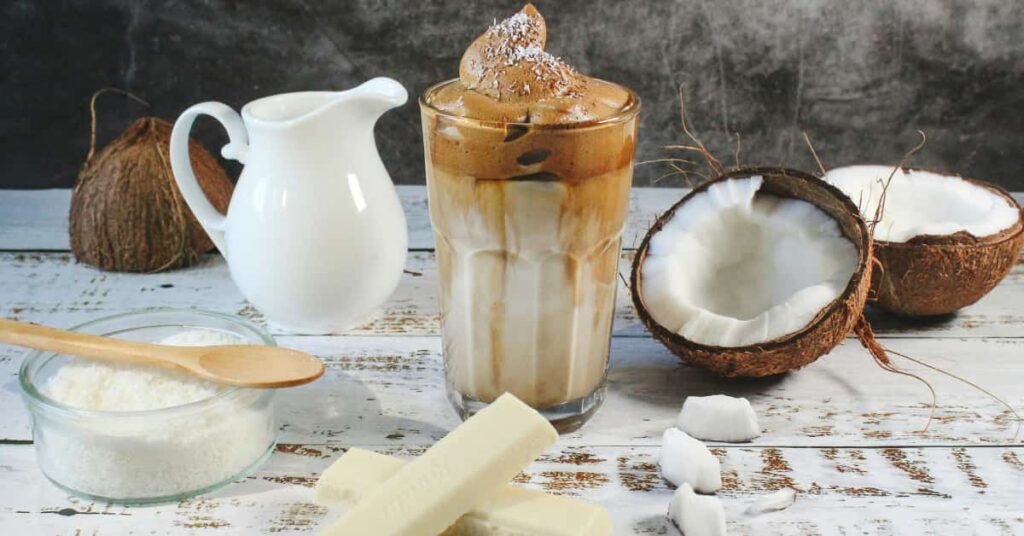
Coconut milk recipe
The process for making own coconut milk is easy. Soak 2 1/2 cups of dried, slivered coconut in 3 cups water for five minutes until smooth. Mix on high for a minute, then push the solids out via a sieve, pressing on the pulp to remove as much milk as possible.
Precautions to Take with Coconut Milk
As with any dietary or natural product, general precautions should be observed when consuming coconut milk. Pregnant women & breastfeeding mothers are advised to consult a doctor before including it in their diet.
Caution is also recommended when offering coconut milk to children or older people. In such cases, it should be consumed only under the guidance or prescription of a qualified medical professional.
Conclusion
Coconut milk is a universal and healthy element with possible health benefits ranging from enhanced digestion to antimicrobial and antioxidant properties. Coconut milk is a universal ingredient and an excellent milk alternative. Like other coconut creations, it may provide health benefits, although more research is required to confirm this. While it can be a valuable addition to a proportional diet, it should be consumed in moderation and not used as a replacement for medical treatment.
Consuming moderate quantities of coconut milk may help lower cholesterol and boost weight loss. The antioxidants it includes may also help defend the body from health problems.


